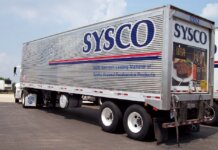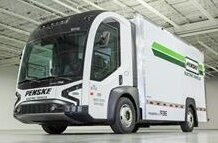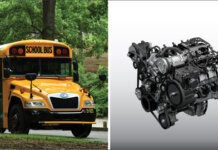Recent arguments for clean diesel are raising questions over the validity of propane autogas as an outstanding choice for school buses. This type of over-simplified information is being widely broadcast. But comprehensive, evidence-based reasoning is what school districts require to make important decisions. School administrators need truth-telling, not storytelling.
So, when it comes to clean diesel and propane autogas, what’s just talk and what’s the truth? Here are just a few factors to consider.
Duty Cycle and Maintenance
Today’s diesel engines are cleaner burning than older models, but claims about their efficiency must be put into a duty-cycle perspective. The complex emission systems that aid the diesel in achieving lower emissions strongly favor duty cycles with high, consistent power utilization, like over-the-road, long-haul applications. Propane autogas is a perfect fit for the duty cycle of school buses, which consists of stop/start at slower speeds with a tremendous amount of idle. This is because the simple and passive emission system on a propane autogas bus won’t degrade in efficiency under these conditions, whereas a modern diesel would likely need more frequent system regeneration or intervention by service personnel.
According to the American School Bus Council, the average mileage per year for a school bus is 12,000. One new entrant to the school bus diesel market touts that its engine can run 35,000 miles in a school bus duty cycle before needing oil and fuel filter changes. But it also states that the oil should be changed every 12 months or 1,000 hours of operation. That is in addition to other diesel-specific maintenance items that aren’t as prominently advertised, such as diesel particulate filter maintenance, diesel exhaust fluid filter change every three years, and engine valvetrain adjustment every two years.
For propane autogas engines, oil changes are recommended every six months or 5,000 miles. When an oil change is required, a propane bus needs as little as seven quarts of oil. A diesel engine takes a minimum of 18 quarts – and a far more expensive oil filter.
Bus Lifespan
Diesel engines have historically had great longevity, and customers have benefited from long, useful service lifespans. A mounting challenge being faced by modern diesel school bus operators isn’t around the core engine; it’s all the ancillary components that didn’t exist before and the staggering cost associated with their repair and replacement. Spark-ignited engines, like propane autogas, have benefited from technology and material innovations. They have longer useful lives than ever before, more than exceeding the demand of the school bus lifespan with much lower repair costs along the way.
According to School Bus Fleet, the average lifespan of a school bus is 12 to 15 years. The average age of school buses on the road is about nine years. Most are retired by 15 years. Many states have regulations that require equipment over a certain age to be taken out of service. The U.S. Department of Energy’s Alternative Fuels Data Center reports that low carbon and low oil contamination of propane can result in longer engine life.
Resale Market
Diesel bus manufacturers highlight their products’ resale value. New clean diesel technology may negatively impact this assertion. The 20 or so components required to meet federal emission requirements on a diesel engine make it challenging to keep the buses operating under warranty. The used-bus market may be resistant to aging buses that require expensive repairs. The cost of clean diesel technology may cause alternatives, including propane autogas school buses, to climb in resale value.
Fuel Efficiency
In a side-by-side comparison, diesel engines look more fuel-efficient than propane autogas. Yet, propane autogas buses cost much less to fuel, even when accounting for fuel economy and the relative difference in energy content. Dollars and cost per mile to operate become the critical metric.
With propane’s consistent and significant price differential to diesel, school districts have reported 15 to 40 cents per-mile savings with propane buses compared to diesel. Furthermore, the U.S. Energy Information Office predicts increasing diesel prices into 2019.
Domestically sourced propane also supports our nation’s energy security. According to the Alternative Fuels Data Center, diesel is manufactured using oil, of which nearly half is imported. No oil is imported specifically for propane production.
Extended-range, 400-mile fuel tanks make propane buses a solid option for school transportation. And when it’s time to fill the tank, school districts can install propane autogas infrastructure for far less cost than any other fuel – not just diesel.
On the Road
Diesel buses, including older models that emit high levels of toxic nitrogen oxides (NOx), currently dominate the school bus market. But the propane autogas school bus market share has grown substantially, with more than 800 school districts across the U.S. currently transporting students in propane school buses. The New York Times reports that of the top 25 school bus markets, 19 have propane-fueled buses in their fleets, including New York, Chicago, Houston, Los Angeles, Miami, Philadelphia and Phoenix.
Every school day, more than 14,000 propane school buses hit the road in the U.S., transporting almost 1 million students in 47 states across the nation. The quiet propane engine means drivers can hear student concerns and concentrate on the road ahead. Propane buses also emit far lower levels of NOx and particulate matter, increasing air quality and minimizing health risks to students and their communities.
Corporations, transit agencies and even countries worldwide understand the benefits of propane autogas. Forward-thinking corporations are choosing alternative fuels like propane autogas due to economic and regulatory compliance reasons. Examples include Bimbo Bakeries, Frito Lay, Peapod and SuperShuttle. Mass transit agencies are also looking to propane vehicles in cities around the nation, including Cleveland, San Diego, Detroit, Pittsburgh, Las Vegas and Kansas City.
Dollars and Sense
Clean diesel buses may carry a lower sticker price than a propane autogas bus. School districts that make the move to propane discover that the low cost of fuel and maintenance compared with diesel often translates to a quick return on investment. The majority of school districts that switch to propane buses recoup their investment within 18 months of use – and that’s without any grants or subsidies. As an alternative fuel, propane can tap into those funding sources, as well, accelerating the savings.
Propane autogas represents a sensible solution for lowering NOx emissions and reducing school districts’ carbon footprint. It takes four propane buses to emit as much NOx as one clean diesel bus. For safer students, healthier communities, higher energy security and sustainable futures, propane buses earn top marks for schools.
Ryan Zic is the school bus sales director for ROUSH CleanTech, a provider of propane autogas and compressed natural gas fuel system technology. His expertise includes direct sales, original equipment manufacturer management, and Tier 1 sales and support. He can be reached at ryan.zic@roush.com or 800-59-ROUSH.






